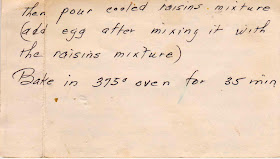That's a long way to get to Poverty Cake but here we are. Initially, I figured it was another version of Depression Cake, Poor Man's Cookies, Canada War Cake or any number of similarly named confections created when butter, sugar and eggs were scarce. But, as the DH said upon trying a slice, "This poverty cake is rich." And it is -- rich in flavor and fat (it has both butter and eggs) and is a really good spice cake -- not at all what one would expect from poverty cake. This would make a perfect after-school snack.
To make the cake, boil the raisins in the water and then add one stick of butter.
Add the rest of the ingredients and then simply pour into an 8 x 8 inch pan, which you've either greased and floured or lined with parchment paper.
This cake travels really well. Of course, I brought some to work...
...where even poverty-fighter-in-chief David Garza had a small piece. (Who would want a big piece of poverty?)
Henry Street's original poverty fighter, founder Lillian Wald, was fond of the expression "full of ginger." This cake isn't full of ginger, but has plenty of other spices.
The cover of the latest edition of Jews Without Money -- a compelling novel certainly worth a read. In it the narrator writes that poverty makes some people insane, and he quotes his father as saying: "It's better to be dead in this country than not to have money."






.jpg)
.jpg)

Fascinating post.Thanks.
ReplyDeleteAllen
Fascinating post.Thanks.
ReplyDeleteAllen
Why, thank you Allen!
DeleteYou might be interested in Anzia Yezierska's disdainful description of a flourless, eggless, butterless cake taught at a settlement school in her novel, Salome of the Tenements.
ReplyDeleteThanks much for the heads up. I will definitely read that book. Recently read The Bread Givers -- and loved it.
Delete